Interview by Anika Mukker
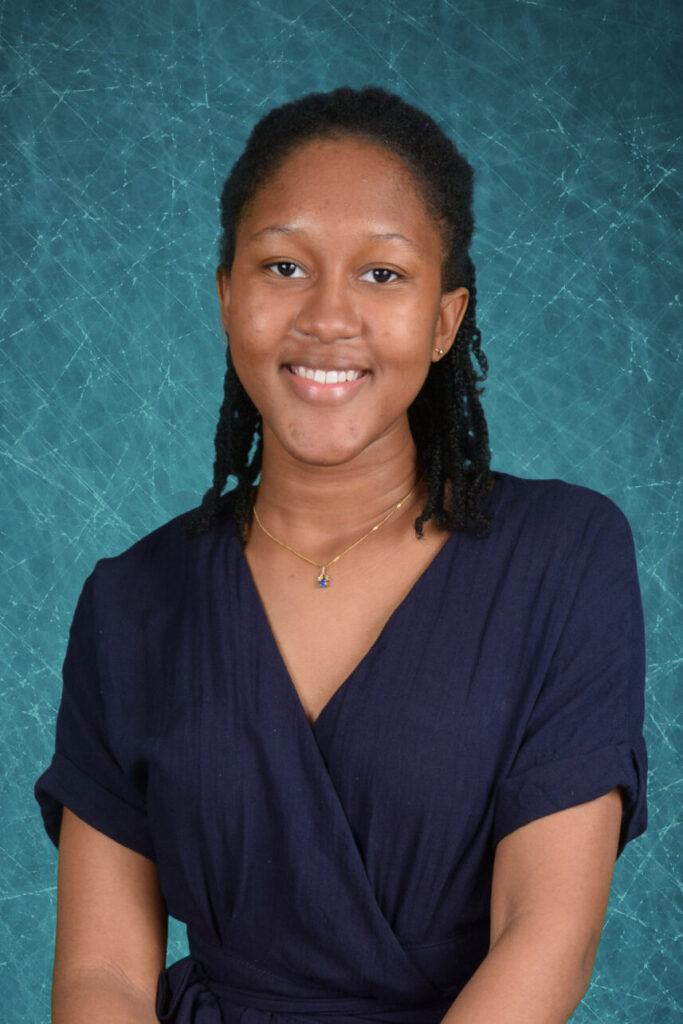
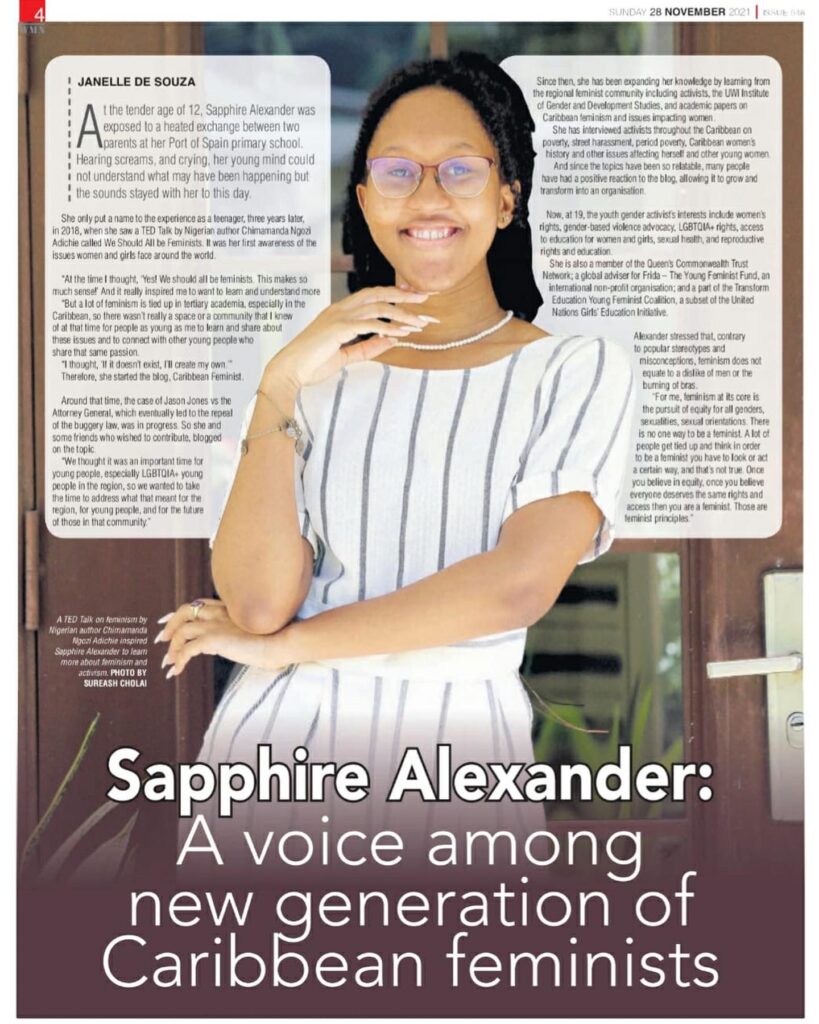
You’re the founder of the organization Caribbean Feminist, which is a community dedicated to discussing social issues as well as educating and empowering feminists in the Caribbean. Can you share a little bit about why you founded this initiative? What impact did you want to create when you started?
I started Caribbean Feminst when I just turned 15 because that was when I became fully immersed in the world of feminism. At that time, when I was learning about feminism, a lot of the icons I had to look up to were western: Gloria Steinem, Ruth Bader Ginsburg, other incredible feminists from America. Then, at that age, I wondered Where is this feminist group for me?
Here, in the Caribbean, a lot feminist movements are linked to women in university. So, for girls my age, girls younger, there’s not really a space or community where we can feel empowered, where we can learn about feminism, where we can organize and build community. So, I said I’m going to create that space for other young women because there’s no way it’s just me who’s passionate about feminism. I started to make blog posts about the issues I found interesting, to create spaces for youth to come together and talk about them.
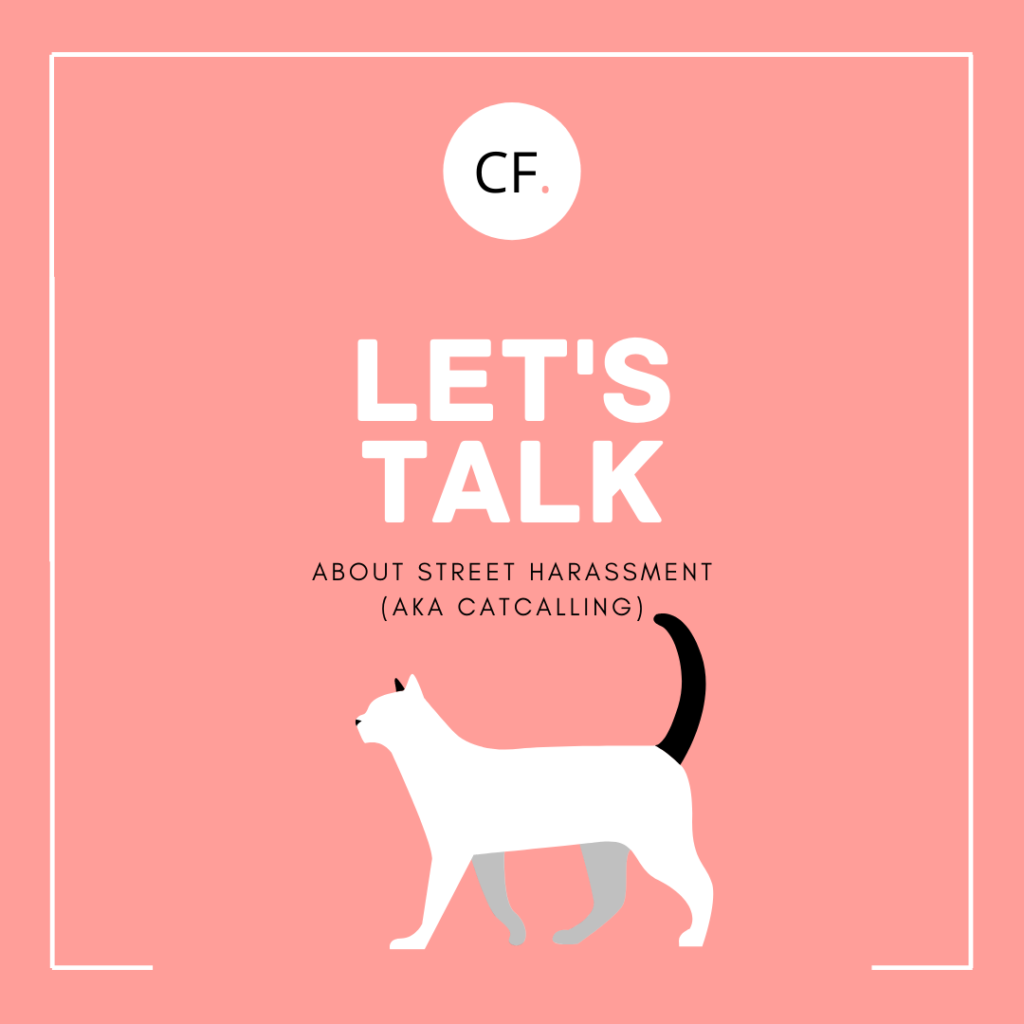
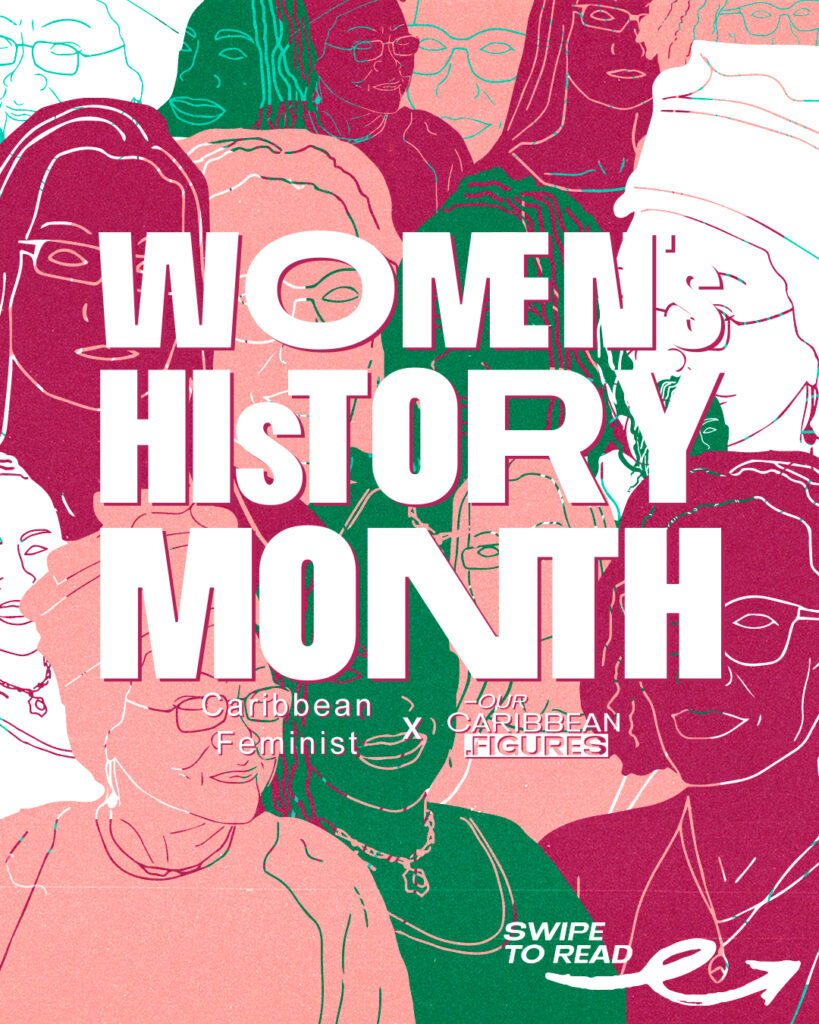
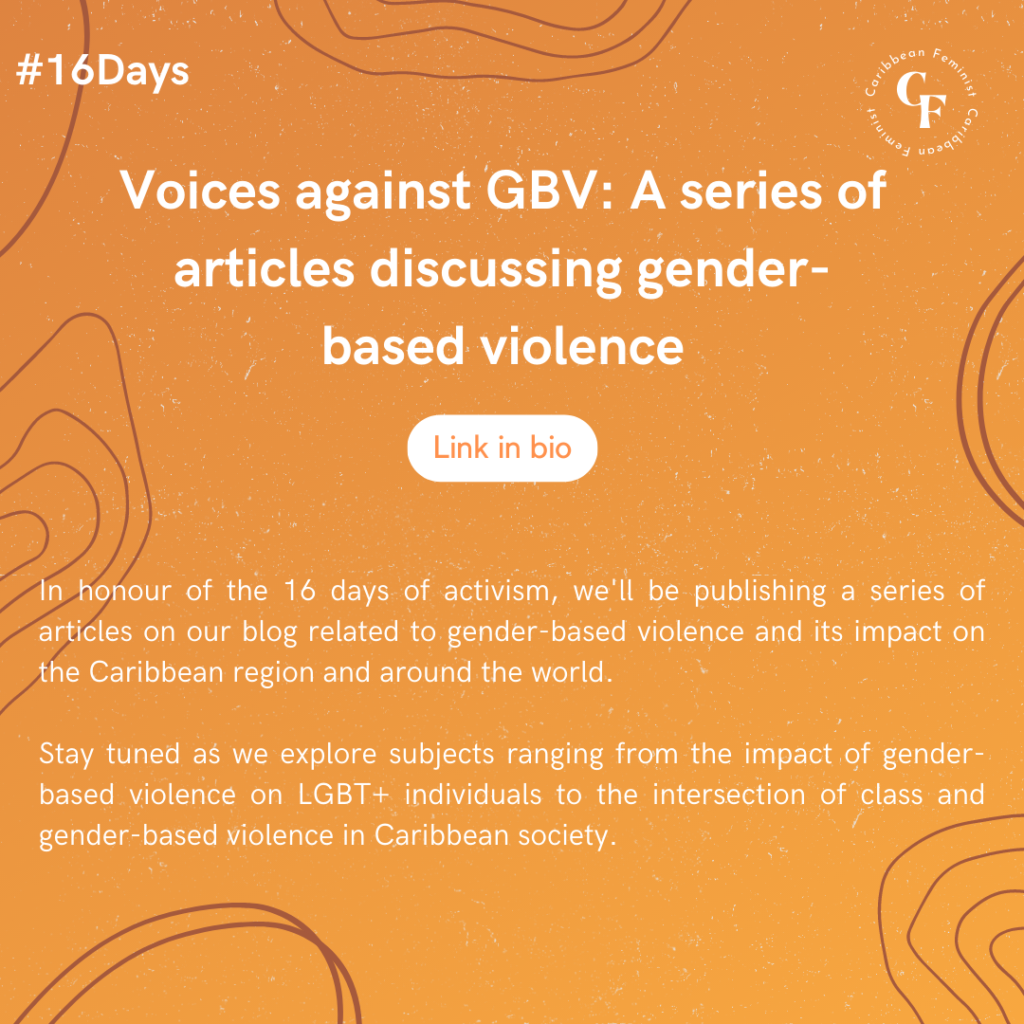
The reason this was such an interesting time to start the project was because there was this case happening at the time called Jason Jones vs State, and it was the first time someone from the LGBTQIA+ community came to challenge a really homophobic law that we had since the ages of colonialism. Jason basically sued the state for violation of his human rights, and he won. That was also the first year we had a pride parade. So, I teamed up with my friends and we wrote — about Jason Jones and the state, about queer representation in media, what it’s like to be a queer youth in the Caribbean. We created a space to discuss what we were feeling at the time with so much change happening. While those were really small steps, they were really significant for us at that time.
In terms of impact, I really wanted to create a community. That has always been my number goal, to create a space where young people feel like they have a platform to share how they feel, to learn in an open and safe space.
Here in the Caribbean, there are certain topics that people say young people should not talk about like comprehensive sexual education. I don’t want to go into slang, but that’s my young people business. As young people, those are the topics we should be thinking about and talking about. I wanted to create a space where young feminists felt they had a space to learn and were empowered in the education they had.
Building off of your comments on the presence of predominantly Western narratives in activist and feminist spaces, why is it so important that our activism is intersectional?
It’s important for feminism to be intersectional because, again, people from minority communities interact with feminism in such different ways. We all have different needs: socioeconomically, mentally, and physically. A lot of times, feminism can be really white-centered. Especially in the Caribbean context, Caribbean feminism is often overlooked: we forget that Caribbean feminism has informed and guided the way that global feminism and intersectional feminism have become successful. I believe that one of the goals of the early wave of feminism was the right to work, but then you forget that women in the Caribbean have always worked and have always been a central part of the economy, a central part of society. So, then, you have a feminism that completely ignores and denies the struggles and work of Caribbean women from the past. I think it is so important to be inclusive in our feminism — to make sure all races, ethnicities, and ways of life are recognized. Intersectional feminism is also the only way we can achieve equity because when we realize the disadvantages other people are facing, when we recognize socioeconomic barriers people face because of their identity, it is only through recognition of them that we can overcome them.
The issue is equality versus equity. When you only have one type of feminism, you’re leaving people out. When you only have one type of feminism, you’re meeting the needs of everyone. Intersectional feminism has that value of equity, where we recognize the obstacles people face based on the intersections of their identity and we’re better able to assist them and resource them based on that.
Additionally, what role do gender stereotypes play in preventing girls from receiving an education and from going on further into positions of leadership? Most importantly, what are some steps that can be taken to end these barriers or create these communities where girls feel they are welcomed and encouraged to learn?
I can really only speak on my experiences here in Trinidad and Tobago, not the entire Caribbean as I haven’t lived there. Although we get kind of clumped together, our policies and practices are quite different.
In terms of gender stereotypes in education, I know a lot of times the value of a boy’s education is placed higher than that of a girl’s, especially in rural communities where access to education is not that easy in terms of transportation and financing. A lot of times, if families can’t afford for both to go to school, the boy will go yet the girl will not. But, one thing that is positive is that we, in Trinidad, have a standard order where children of primary age are mandated to go to school. So, if you are of that age and you’re not going to school, your parents will be fined. What then happens is that a lot of young girls have an opportunity to get an education because it’s legally mandated. However, when you enter secondary school, it is no longer mandatory for youth to go to school. That is where we see the “drop off,” the gender gap between women and men. Often, girls will have to leave school to find work, to support their families.
Then there are these more general stereotypes. Girls are more likely to do home economics and music and follow arts and humanities related fields whereas boys are more likely to do STEM and take on more technical jobs. While a lot of girls will do STEM in high school, you’ll see them drop off in college.
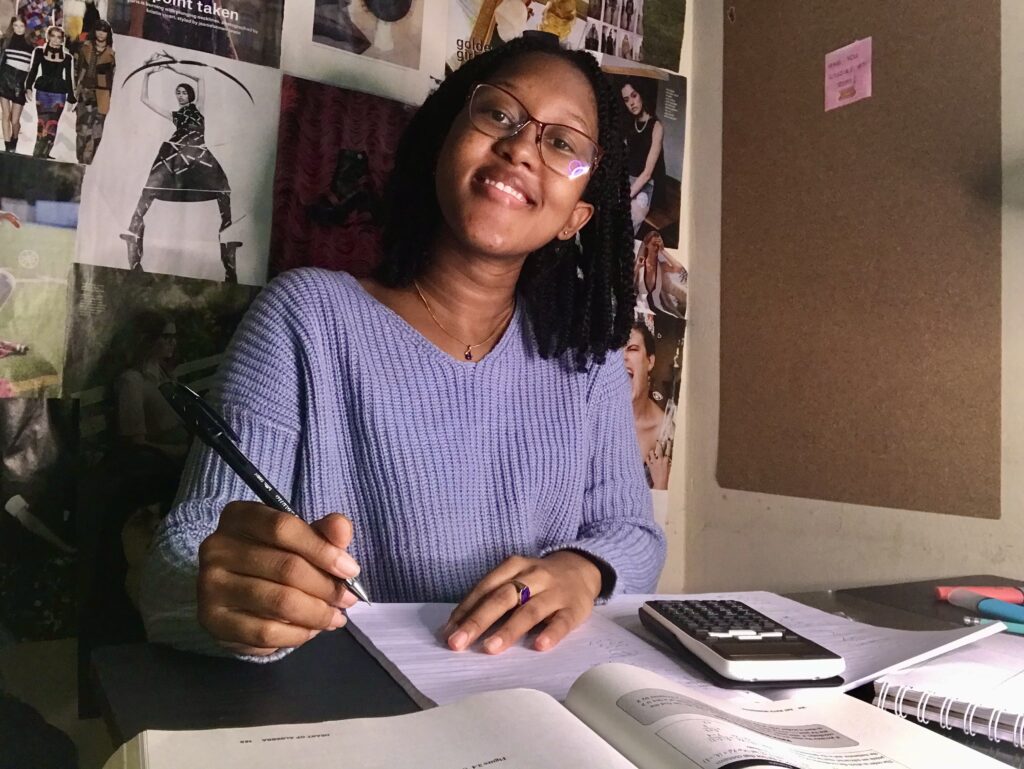
Promoting inclusivity in education is really beneficial; promoting that girls in STEM can do well is really beneficial. I focused on computer science in secondary school, and there were seven girls on that path. When we would go to additional classes, we would always be outnumbered. You could count the number of girls on one hand while boys would always be in double digits. I think showing young women that STEM is accessible to them and that they can excel in those fields is definitely something to be uplifted. I’m seeing a movement of that here. For example, we have an organization that does Girls Who Code events, where they host all girls coding events. They bring young women from around the Caribbean together and teach them the skills they need to excel in the competition and partner them with mentors. I’d love to see more initiatives like this that encourage girls to pursue fields where they are so underrepresented.
In terms of leadership, women in leadership is always a difficult issue. I think our Parliament is currently 22% women, which is not great, but, in a global sense, we are ranked 37 out of 180 countries in terms of gender parity in politics. While it is important to have representation, what is more important is that women in power politically make a difference and that they apply an intersectional perspective in leadership. A lot of times, we don’t get that. I can say so for a fact. Currently, Trinidad and Tobago has a female president, and she has done very little, which is very disappointing. Having a female president is such a triumph; there are not many countries that can say they’ve had that. But, then, you see that she hasn’t supported movements for women’s rights. For instance, we had a huge surge in gender based violence during the pandemic, a lot of femicides happening in a short period of time. To see that female politicians were silent during that time was really heartbreaking, really disappointing. You would think that having greater representation in politics would mean greater representation in policy and legislation, but that hasn’t happened.
However, there has been a movement to encourage girls to pursue leadership roles, in politics and other fields. Often, you see women leading in sectors like education and child and youth affairs but not finance or digital technologies. There are definitely gender stereotypes that extend from school into political office.
I’ve had the opportunity to ask one of our independent senators about why there aren’t more women in politics. He turned and said to me “It’s because women have children. If you aren’t in Parliament, you can’t have a child. Sometimes you’re in Parliament for 12 hours. You can’t have a child as a politician.” I was thinking, “There are a lot of male politicians here who have children. They are able to present their cases to be effective in Parliament.” To think that that is the attitude in Parliament is so embarrassing and frustrating because how then are we supposed to have progressive policies? Because he is considered one of the country’s progressive politicians. I haven’t even begun discussing the LGBTQIA+ community. I haven’t even touched on that yet.
This, however, isn’t true for all islands. For example, if you look at Barbados, Mia Mottley is an incredible icon. She is a beacon of light in the Caribbean. I think even historically female politicians in Barbados have led the charge. I can go off on this for ages. For example, there’s this one woman I learned about recently named Billie Miller from Barbados, the first female politician in Barbados and the only one at that time. And she was the one who legalized abortion in Barbados, the first English speaking country in the Caribbean to do so. She did that in an all male Parliament. I think that is the difference between transformative female leadership and just filling in a quota. She did that by herself. She said that she went to every male politician in the cabinet and told them that women and girls are dying and we need transformative policy to assist them. And she got it. I hope to see these changes in Trinidad and Tobago’s future. Myself and other feminist organizations are pushing for that; we’re pushing for these issues. We’re pushing for inclusivity in leadership, but it’s slow going.
Cycling back to Mia Mottley and Billie Miller, the transformative impact they’re having extends beyond women’s issues into climate issues as well. Mia really stresses the strengths of the Caribbean. It’s the fact that the Caribbean has been used and abused to uplift other nations around the world. The reason why the US and UK are so strong financially is because they used and exploited the resources here in the Caribbean. Still, we have been able to build from nothing. In so many areas, we’ve been able to excel. For instance, we have universally funded tertiary education, but this isn’t recognized. We often have an idea that the Caribbean is a place to party and relax: the Caribbean is coined the world’s vacation spot. We tend to be overlooked in terms of the political, social, and economic strides we have made. We are often lumped into this idea “Here’s where you go for Carnival,” but we are so much more than that.
In continuation of that point, how have global perceptions of the Caribbean impacted the region’s representation in international spaces of decision making, specifically relating to the climate change? Since a lot of your advocacy is also centered around climate action, what action needs to be taken to address the crisis?
We are on the frontlines of the climate crisis, yet we still get almost no support when it comes to mitigating climate change. For COP26 and all those huge climate conferences, the Caribbean is almost nonexistent in terms of representation. But, we are on the frontlines, in that we are seeing all of these impacts happen.
In the Caribbean, we’re on that line where we’re sunny 24/7 and recently we’ve been getting hail — snow in some areas. Right before our eyes, we are seeing the consequences of climate change happen. There are islands like Tuvalu that aren’t going to disappear — they are disappearing. They are going underwater. The Caribbean is disappearing. Climate change is wreaking havoc on us, and we are so overlooked in the global dialogue about climate change.
What is going to end up happening indefinitely is that, when climate change wreaks havoc, millions of climate refugees are going to come from the Caribbean. It is going to come down to other countries and what they are going to do. Where are we going to go? Instead of mitigating and including Caribbean dialogue, we’re focusing on Western narratives. We have a lot of climate activists here in the Caribbean, but I have yet to see a single one highlighted.
One thing that I’ve noticed is that we get grouped together with LatAm, and 9 times out of 10, the representative will be from Latin America. The perspectives, in that way, are very skewed. This creates this idea of hopelessness in our region because we are overlooked so often. There is a lot to unpack there, with our representation on the global stage.
Climate change, in general, is something that is really important to me, as a person from the Caribbean. Our culture is very climate conscious, but we’re still an oil and gas economy. What we really need to focus on is energy alternatives because our resources are dwindling and we have no backup plan. We also need to focus on holding multinational organizations accountable for their waste because there is no legislation for that at the moment. Nada.
A lot of the work comes down to individual impact at the moment. So many people do small things in their own lives to mitigate climate change. For example, we have a plastic recycling plant. We also just have that culture of reduce, reuse, and recycle. There’s this running joke in the Caribbean that “You’ll have a biscuit tin but there will never be biscuits in it.” While you can look at that statement from one perspective as something relatable, it is also quite indicative of our culture. Culturally we do take steps to reduce waste.
That being said, to mitigate climate change, we’ve reached the point where action needs to go beyond the community level. We need reform and change in legislation.
How have your community and cultural identity shaped the causes that you advocate for, the causes that you are passionate about?
Like I’ve talked about, climate change is something I’m really passionate about. Then, things like period poverty and gender based violence, those are issues that really impact my community, especially gender based violence. Here in the Caribbean, we’ve seen a marked increase in gender based violence because of the economic crisis — the financial strain on the economy. A lot of people in the service, tourism, and Carnival industry have lost their jobs, leaving them unable to support their families. What that does is correlate to increase the rates of gender based violence. While there have been movements for legislation to assist with that, a lot of organizations are working to mitigate GBV, we need to focus on changing ideas on a community level — ideas of toxic masculinity — and the way that men and women interact.
They call it suiting, but it’s common for random men to harass women on the streets. Although it makes a lot of women uncomfortable, the actions are justified as part of the culture. We had a really bad go of it with femicides last year. There were two young girls who were brutally killed within the span of a month. What happened was that they took a taxi to go home, but they never made it home. One of the girls, Andrea Barrett, her taxi had a P (personal/unregistered) plate. We’re told to generally take H cars which are registered in the taxi service. While they have that regulation, it is not always enforced. I can speak from my personal experience — and this is the experience of a lot of young women. When you are traveling, 9 times out of 10, there are only going to be P (personal vehicles). Then you only have the options of staying at the taxi stand, which is incredibly dangerous in its own right, or taking the risk of going in a P car. Andrea assumed her taxi was an H car but it was actually a P (the plates were falsified). She was abducted and murdered.
Then there was Ashanti Riley, who was at her grandmother’s house for her grandma’s birthday. The same thing happened to her.
This really impacted a lot of us because a lot of women travel. Here, the majority of people traveling in taxis are young women and girls. To then understand on our nation’s roads is something you don’t know how to feel because you see yourself reflected in these young women. Girls go missing every single day, and you can’t help wondering if you’re next.
When you see this, it affects you. There were protests, calls on the government to change the taxi registration process, calls on the government to regulate P cars, calls on the government to do something to make sure girls feel safe on the nation’s roads. It’s been a year, but there is still nothing that has been done. Women and girls are still living this experience now, like a game of Russian Roulette with your life every time you get into a taxi.
This was a core issue we focused on with Caribbean Feminist last year because no girl should feel unsafe in the country she lives in.
My friends and I talk about it all the time, but I would never leave my house by myself because I would never feel safe to do so. You would be hard pressed to find a woman or girl who would leave her house by herself because we understand how dangerous it is. There’s the additional problem that Trinidad is so small, which creates a sort of bystander culture. That is their brother, cousin, uncle, so they won’t come out and say “He did this to this girl. He was missing for these two days.” That’s a huge problem, and we’re planning to press the government on it again this year.
This goes back again to the idea of female leadership. When female leaders are there but not receptive, not doing the work. We had a female president when the girls were murdered, but she said nothing, not a statement, nothing. And, for young women in Trinidad, it was like “Who’s there for us? Who’s there to make sure we make it home?”
What advice do you have for a girl who wants to make a difference in her community but doesn’t know where/how to start?
To a young girl, I would say speak up, don’t be quiet, don’t be discouraged. Don’t stop demanding better of your government. More than anything, don’t stop demanding better.
A lot of times, young women can feel like they don’t have a voice or perspective because that’s the attitude that is perpetuated when you see girls screaming and begging and no action is being taken. But, I would say, don’t stop protesting, don’t stop educating, don’t stop advocating. Your words do have weight, and they will create change. Even if it’s at a snail’s pace, even if it feels slow, change is happening. It is gradual, but it’s happening. Only through our continued advocacy can we see better for future generations.
Connect with Sapphire!
- @saph.alexander
- Caribbean Feminist: Instagram / Website